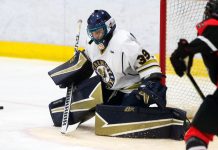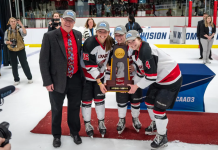There are games in a season that can be season-changers. They are games you should have won but lost, and they sent you in a downward spiral. Or they’re games that you won despite overwhelming adversity — statement games that propelled you ahead.
When you see a lot of college hockey, the chance to see one or two of these games increases and last Saturday was the latest in a series of those games. They look like just another game on the schedule but they have had pretty unique potential to affect the big picture.
Start with Saturday night in East Lansing, Mich. A night after what was a dreadful game by Miami, a game in which their defense was soft and their goaltending substandard, the RedHawks coaching staff reacted. Saturday night they dressed 15 skaters, scratching defensemen Will Weber and Cam Schilling and penciling in only nine forwards.
It was outstanding, a move that even if they had lost was the absolute right call by Enrico Blasi to wake his team up. Coming off two losses at Ohio State and two home wins against 11th-place Bowling Green the RedHawks were undone on Friday by a Michigan State team that worked hard and seemed to score on every shot.
Blasi had a major crisis on his hands because with the RedHawks out of the top 11 in the PairWise Rankings (where they need to be to guarantee an at-large berth to the tourney) he needs wins and he might have to win out in the CCHA tournament. Desperation time was at hand and he placed the season in the hands of three players: Carter Camper, Andy Miele and Pat Cannone. He entrusted the game to Connor Knapp in goal and he answered the bell with a shutout.
These battle-tested senior centers, as good a 1-2-3 set of centers college hockey has seen in a decade, rose to the occasion. Cannone gave Miami shift after shift of extra effort and consistency. Camper found big shifts in a game where Michigan State kept a little closer on eye on him. And Miele scored yet another highlight-reel goal and skated and played as if the season were on the line.
Knapp gave Miami saves when it needed them and shook off a poor relief performance the night before. The bottom line was Blasi set off a bomb in his dressing room post game Friday night and the survivors of the blast rebuilt the town and kept it thriving.
That sends us to the other CCHA team that needed a wake-up call after a road loss Friday, and that was Notre Dame, the latest team to lean that Ohio State is once again playing for keeps.
The Domers were routed Friday by the Buckeyes and also needed a response. Coach Jeff Jackson discussed the game and felt Notre Dame didn’t play all that badly, allowed the captains to have a players-only meeting, and made two lineup changes. Feeling that Friday was more about average goaltending and bad bounces, he let the effort from Friday morph into a better all-around game Saturday and the Irish responded.
That sets up the game of the night in college hockey this Friday as the RedHawks travel to South Bend for a matchup with the Fighting Irish (7:35 p.m. EST, CBS College Sports). The teams both are explosive offensively and rank in the top 10 in the nation in scoring. Notre Dame has three scorers with double-digit goals, and Miami has five. Both teams have defense corps that get involved in the play.
It is a game that, despite the high places they each hold in the CCHA standings, is almost a must-win for both on several levels coming off last weekend.
Moving through the CCHA, another game stands out.
This one happened in relative obscurity. While the outdoor game was going on in Ann Arbor last month, the game of the night turned out to be indoors in Kalamazoo. On a night the first Broncos Division I team was being honored the current one was saving its season.
Lake Superior State won the Friday night contest big. Western Michigan was up 2-1 at home midway through and had outshot Lake State 12-1 in the first period. The Lakers opened it up midway through the second and, despite being outshot 29-19 for the game, won it 5-2.
The next night Western stayed the course and despite a 1-0 deficit entering the third period (and a great game in goal by Kevin Kapalka of Lake State) the Broncos came back. They scored on a delayed penalty and then on the ensuing power play for a 2-1 lead and won 4-1. It was a terrific game, hotly contested, and had pretty good up-and-down action in a raucous Lawson Arena. Since then, Western Michigan has played nine games, won five in regulation and two of four others in shootouts. They currently sit in a three-way tie for fourth place in the CCHA.
Over in Hockey East, the Maine Black Bears put out some fires after a 7-1 thrashing at the hands of Merrimack. As it has done in recent weeks, Maine lost a game, got angry, regrouped and won its next game. After blowing a 3-1 third-period lead to New Hampshire at Alfond Arena, the Black Bears took it out on Massachusetts winning 4-1. After a hellacious travel excursion to Fort Myers, Fla., for the Florida College Classic they lost to Miami and the rebounded to beat Cornell in OT. Then came the Merrimack disaster.
Maine licked its wounds and hosted Providence in its next game and won it on a Friday night. Next came a Sunday night game on national TV against the defending champs from BC, and Maine got on the Eagles early and often. They chased two-time national champion goalie John Muse from the nets with a 4-0 lead and won 4-1. They overcame a 2-0 deficit at Northeastern this weekend for a 3-3 tie.
It was the second time Maine needed a big win to right the ship after a bad loss. Early in the season after a 3-2 loss at Michigan State, a game where the Spartans outplayed them in many areas, Maine needed a win. The Black Bears came home to play second-ranked North Dakota on national TV and thrashed the WCHA heavyweights 7-2 en route to a weekend sweep. They went 5-0-1 in their next six.
UNH had a similar situation, and despite it being early you’ll see that the game was a big one. The Wildcats faced an October/November schedule from hell. They started out with a back-to-back Frozen Four team, Miami, in a two-game set in Oxford. They dropped the opener 6-3 in a game on national TV. The next night they Wildcats beat Miami 6-3, responding very well to a somewhat lethargic game the night before.
Following that game they went 6-0-3, winning at Cornell, at BC and against BU, which was a top-three team at the time. They tied Michigan, Northeastern and Massachusetts. Then they lost to BU on Nov. 20 and after that responded with a 6-1-1 run. Those are two examples of games won by UNH after a loss that sent them off on major runs.
Response to adversity is the name of the game in sports and in life. It will continue to be a theme as we head toward the postseason.


